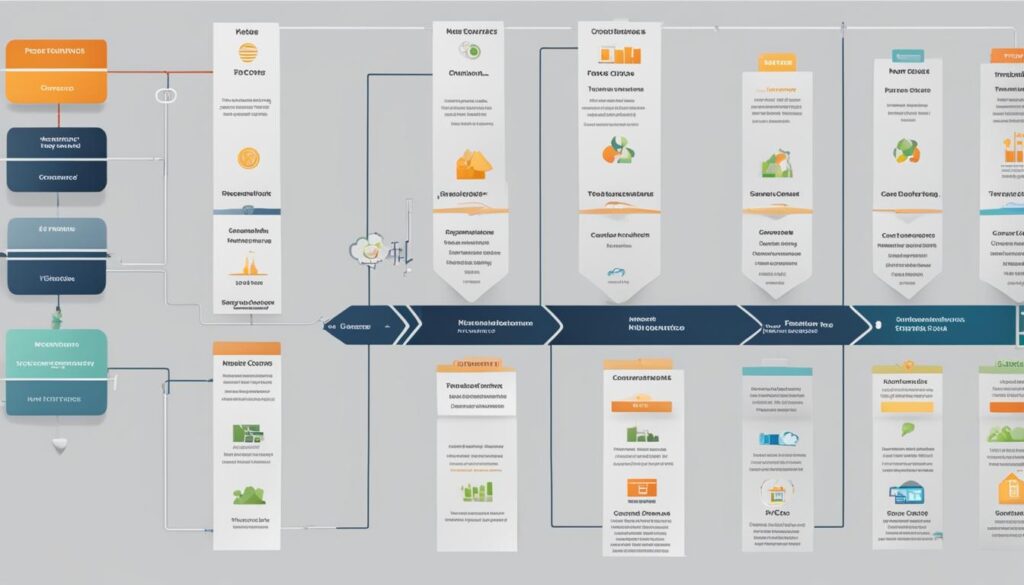Thematic ETFs, also known as specialized funds, provide investors with the opportunity to make targeted investments in specific sectors or themes that align with their interests or investment strategies. These investment vehicles concentrate on industries, trends, or themes such as technology, sustainability, or emerging markets. Thematic ETFs offer the potential for lucrative rewards but also carry significant risks. Despite market challenges, they have demonstrated resilient growth and gained popularity, particularly due to their alignment with environmental, social, and governance (ESG) principles.
Key Takeaways:
- Thematic ETFs allow investors to invest in specific sectors or themes aligned with their interests.
- These specialized funds offer the potential for higher returns but also carry significant risks.
- Thematic ETFs have shown resilient growth and gained popularity due to their alignment with ESG principles.
- They provide early exposure to emerging sectors such as renewable energy, robotics, and blockchain.
- Investors should carefully consider the advantages and risks before making investment decisions.
The Growth and Popularity of Thematic ETFs
Thematic ETFs have been experiencing significant growth in recent years, fueled by the increasing demand from investors looking to capitalize on specific industry trends or sectors. These specialized investment vehicles have managed to thrive despite the challenges faced by the sectors they target, demonstrating their resilience and appeal.
One of the key factors contributing to the popularity of thematic ETFs is their alignment with environmental, social, and governance (ESG) principles. As public interest in sustainable practices and emerging technologies continues to grow, investors are drawn to thematic ETFs that focus on areas such as renewable energy, robotics, and blockchain. This alignment with ESG principles has helped drive the popularity of thematic ETFs and attract investors who prioritize socially responsible investing.
Thematic ETFs have gained popularity due to their alignment with environmental, social, and governance (ESG) principles and public interest in emerging technologies and practices.
The growth of thematic ETFs is a testament to the appeal of targeted investments in specific sectors or themes. These investment vehicles allow investors to tailor their portfolios to industries and trends that align with their interests and beliefs. By providing exposure to niche sectors, thematic ETFs offer the potential for higher returns compared to broader ETFs, making them an attractive option for those seeking potentially more lucrative investment opportunities.
Table: Top 5 Thematic ETFs by Assets Under Management (AUM)
| Thematic ETF | Assets Under Management ($) | Expense Ratio |
|---|---|---|
| Invesco Solar ETF (TAN) | 1,200,000,000 | 0.70% |
| iShares Clean Energy ETF (ICLN) | 800,000,000 | 0.46% |
| Vanguard Information Technology ETF (VGT) | 700,000,000 | 0.10% |
| iShares Global Clean Energy ETF (ICLN) | 600,000,000 | 0.46% |
| Vanguard Health Care ETF (VHT) | 500,000,000 | 0.10% |
The table above showcases the top 5 thematic ETFs by assets under management (AUM). These ETFs represent different sectors, including solar energy, clean energy, information technology, and healthcare. It highlights the significant amount of capital invested in these specialized funds, further demonstrating their growing popularity and the confidence investors have in them.
Types of Thematic ETFs
Thematic ETFs offer investors a wide range of options to capitalize on specific sectors or themes. Here are some of the most prominent types of thematic ETFs:
Technology ETFs
Technology ETFs focus on companies driving technological innovation. They invest in sectors such as cybersecurity, artificial intelligence, and blockchain technology. These ETFs provide exposure to cutting-edge technologies and offer investors the opportunity to participate in the growth of the tech industry.
Healthcare ETFs
Healthcare ETFs capitalize on the growth of the healthcare sector. They invest in companies related to biotechnology, pharmaceuticals, medical devices, and other healthcare-related industries. These ETFs enable investors to gain exposure to the ever-evolving healthcare industry.
ESG ETFs
ESG ETFs are designed for socially responsible investors. They focus on companies that meet specific environmental, social, and governance criteria. These ETFs allow investors to align their investments with their values and support companies that prioritize sustainability and responsible practices.
Consumer Trend ETFs
Consumer Trend ETFs target companies at the forefront of evolving consumer preferences and behaviors. They invest in sectors such as e-commerce, digital entertainment, and sustainable products. These ETFs provide exposure to trends shaping consumer behavior and offer investors the opportunity to capitalize on changing market dynamics.
Emerging Market ETFs
Emerging Market ETFs provide exposure to undeveloped or underdeveloped markets characterized by rapid growth and development. These ETFs invest in companies operating in emerging economies, offering investors the potential for high returns. Emerging Market ETFs enable investors to diversify their portfolios and access markets with significant growth potential.
| Type | Description |
|---|---|
| Technology ETFs | Focus on technological innovation in sectors such as cybersecurity, AI, and blockchain technology. |
| Healthcare ETFs | Invest in companies related to biotechnology, pharmaceuticals, medical devices, and other healthcare-related industries. |
| ESG ETFs | Designed for socially responsible investors, focusing on companies that meet specific environmental, social, and governance criteria. |
| Consumer Trend ETFs | Target companies at the forefront of evolving consumer preferences and behaviors, such as e-commerce and sustainable products. |
| Emerging Market ETFs | Provide exposure to rapidly growing markets in emerging economies. |
Benefits of Thematic ETFs
Thematic ETFs offer several benefits to investors who are looking for targeted exposure to specific sectors or themes. Here are some key advantages of investing in thematic ETFs:
Niche but Diversified Investment
Thematic ETFs provide targeted exposure to specific sectors or themes while maintaining diversification within that theme. By investing in a thematic ETF, investors can focus on an area of interest while spreading their investment across multiple companies and subsectors within that theme. This approach allows for potential growth opportunities while mitigating the risk of relying on a single company or stock.
Flexibility and Access
Thematic ETFs offer flexibility as they can be bought or sold at any time during the trading day. This provides investors with the ability to react quickly to market changes or take advantage of emerging opportunities. Additionally, thematic ETFs provide early access to emerging sectors that may not be available through traditional investment vehicles. Investors can capitalize on the potential growth of these sectors before they become mainstream.
Professional Management
Thematic ETFs are managed by professionals who possess specialized knowledge and expertise in the specific sector or theme. These expert portfolio managers conduct in-depth research and analysis to identify the most promising companies within the theme and adjust the portfolio accordingly. This professional management helps investors make informed investment decisions and potentially outperform the broader market.

The Risks of Thematic ETFs
While thematic ETFs offer potential rewards, they also come with certain risks that investors should be aware of. Understanding these risks is crucial for making informed investment decisions and managing expectations.
Risk of Concentration
One of the main risks of thematic ETFs is the risk of concentration. Because thematic ETFs focus on specific sectors or themes, they can be heavily influenced by the performance of those sectors or themes. If the theme underperforms or faces challenges, it can lead to significant losses for investors.
Market Timing Risks
Investing in thematic ETFs also carries market timing risks. Thematic ETFs often target emerging trends or sectors that are expected to grow in the future. However, predicting the success of these trends can be challenging, and there is always the risk of investing at the wrong time. If a trend fails to materialize or faces unexpected setbacks, it can result in losses for investors.
Hype and Overvaluation
Thematic ETFs can also be susceptible to hype and overvaluation. When a particular theme or sector becomes trendy or popular, there can be speculation and increased investor interest. This can drive up the prices of the ETFs, potentially leading to overvaluation. If the hype subsides or the theme is not sustainable, the ETFs may experience a decline in value.
Liquidity Risk
Another risk associated with thematic ETFs is liquidity risk. Some thematic ETFs may have lower liquidity compared to broader, more established ETFs. This means that there may be limited buyers or sellers in the market for these ETFs, making it difficult to buy or sell shares without affecting the market price. Investors should consider the liquidity of an ETF before investing to ensure they can easily enter or exit positions.
| Risks | Description |
|---|---|
| Risk of Concentration | Thematic ETFs focus on specific sectors or themes, which can lead to significant losses if the theme underperforms. |
| Market Timing Risks | Thematic ETFs invest in emerging trends, making it challenging to predict their success and potentially resulting in losses |
| Hype and Overvaluation | Thematic ETFs can be susceptible to hype and overvaluation, particularly if there is speculation surrounding a trendy theme. |
| Liquidity Risk | Some thematic ETFs may have lower liquidity, making it difficult to buy or sell shares without affecting the market price. |
Pros and Cons of Thematic ETFs
Thematic ETFs offer unique advantages to investors seeking targeted exposure to specific sectors or trends. Here are some of the pros and cons to consider before investing in thematic ETFs:
Pros of Thematic ETFs
- Targeted Exposure: Thematic ETFs allow investors to focus their investments on specific sectors or themes that align with their interests or beliefs. This targeted exposure can provide the opportunity for potential growth and capitalization on emerging trends.
- Diversification: Despite their emphasis on a specific field, thematic ETFs typically invest in multiple companies within that sector. This diversification helps to mitigate risk by spreading investments across various companies, reducing the impact of any single company’s performance.
- Flexibility: Thematic ETFs can be bought or sold at any time during the trading day, providing investors with flexibility and the ability to react quickly to market conditions or changes in their investment strategy.
- Early Access: Thematic ETFs offer investors the opportunity for early access to emerging sectors and trends. This can provide the potential for higher returns as these sectors experience growth and gain wider recognition in the market.
- Professional Management: Thematic ETFs are managed by professionals who possess specialized knowledge in the specific sector or theme. This professional management ensures that investors benefit from the expertise and research of experienced fund managers.
Cons of Thematic ETFs
- Concentration Risk: Thematic ETFs focus on specific sectors or themes, which can lead to significant losses if the theme underperforms. Investing in a single sector or theme can expose investors to higher volatility and potential downside risks.
- Market Timing Risks: Predicting the success of emerging trends can be challenging, and investing in thematic ETFs requires careful consideration of market timing. Investing at the wrong time could result in missed opportunities or losses if the theme fails to gain traction.
- Hype and Overvaluation: Thematic ETFs can be susceptible to hype and overvaluation, particularly if there is speculation or excessive enthusiasm surrounding a trendy theme. This can lead to inflated prices and potential future corrections.
- Liquidity Risk: Some thematic ETFs may have lower liquidity compared to traditional ETFs. This means that it may be more difficult to buy or sell shares without affecting the market price, potentially resulting in higher transaction costs or limited trading opportunities.
It’s important for investors to carefully weigh the pros and cons of thematic ETFs before making investment decisions. While these specialized funds offer unique opportunities, they also come with inherent risks that should be considered in the context of an investor’s overall portfolio and risk tolerance.

| Pros of Thematic ETFs | Cons of Thematic ETFs |
|---|---|
| Targeted Exposure | Concentration Risk |
| Diversification | Market Timing Risks |
| Flexibility | Hype and Overvaluation |
| Early Access | Liquidity Risk |
| Professional Management |
Conclusion
Thematic ETFs, as specialized funds, provide investors with the opportunity to make targeted investments in specific sectors or themes. Despite market challenges, these funds have gained popularity and demonstrated resilient growth. Thematic ETFs offer a range of benefits, including targeted exposure, diversification, flexibility, early access to emerging sectors, and professional management.
However, it’s important to consider the risks associated with thematic ETFs. Concentration risk and market timing risks are factors to be mindful of, as the performance of specific sectors or themes can have a significant impact on the fund’s returns. Additionally, some thematic ETFs may be less liquid compared to traditional ETFs, which can affect the ease of buying or selling shares.
Investors interested in thematic ETFs should carefully evaluate the advantages and disadvantages to make informed investment decisions. These specialized funds can be a valuable addition to an investment portfolio, allowing individuals to capitalize on specific trends and opportunities in the financial landscape. It’s essential to assess one’s investment goals, risk tolerance, and time horizon before investing in thematic ETFs or any specialized fund.
FAQ
What are thematic ETFs?
Thematic ETFs are specialized investment vehicles that concentrate on specific industries, trends, or themes, such as technology, sustainability, or emerging markets.
Why have thematic ETFs gained popularity?
Thematic ETFs have gained popularity due to their alignment with environmental, social, and governance (ESG) principles and public interest in emerging technologies and practices.
What types of sectors or themes do thematic ETFs focus on?
Thematic ETFs can focus on various sectors or themes such as technology, healthcare, ESG, consumer trends, and emerging markets.
What benefits do thematic ETFs offer?
Thematic ETFs offer targeted exposure, diversification, flexibility, early access to emerging sectors, and professional management.
What are the risks associated with thematic ETFs?
Thematic ETFs carry the risk of concentration, market timing risks, hype and overvaluation, and potential liquidity issues.
What are the pros and cons of thematic ETFs?
Thematic ETFs provide targeted investments in specific sectors or themes, but they also come with risks such as concentration risk and market timing risks.
Are thematic ETFs a good addition to an investment portfolio?
Specialized funds like thematic ETFs can be a valuable addition to an investment portfolio, allowing investors to capitalize on specific trends and opportunities in the financial landscape.
How Do Specialized Funds Compare to Mutual Funds in Terms of Diversification and Professional Management?
When considering diversifying investments with professional management, special funds and mutual funds differ in key aspects. Specialized funds, with a focus on specific industries or sectors, provide targeted diversification opportunities. Mutual funds, on the other hand, offer more diversified portfolios and are professionally managed to maximize returns for investors. Both options have their merits based on individual goals and risk tolerance.


Pingback: Sector ETFs: Focusing Investments on Specific Industries – Straight Fire Money